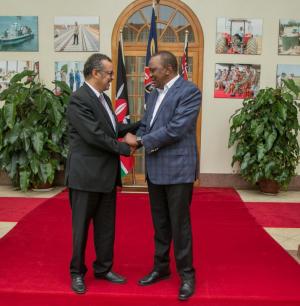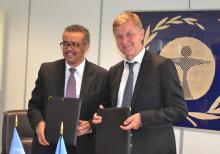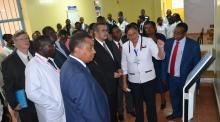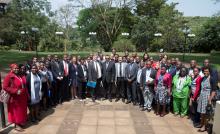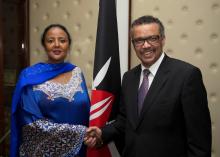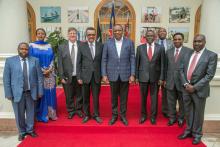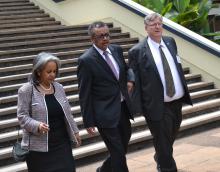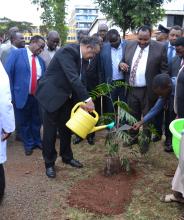WHO Director General Dr Tedros visits Kenya
January 10, 2018 - WHO Director General Dr Tedros Adhanom Ghebreyesus made his first official visit to Kenya this week to meet with a range of persons in Kenya on health and policy issues and the environment. He held a meeting with President Uhuru Kenyatta, signed an agreement on health and environment between UN Environment and WHO and had discussions with senior government officials in health and foreign affairs. He also met global, regional and country UN heads of agencies based in Nairobi, WHO staff in Kenya and visited a county hospital in Kiambu, outside Nairobi.
His meeting with the President focused on implementing Universal Health Coverage and the President’s four priority areas of government delivery (Big Four) which include affordable healthcare, food security, affordable housing and manufacturing.
The DG said he was greatly impressed by President Kenyatta’s commitment and choice of four priority areas which would directly impact healthcare. “I am very impressed by these priority areas and the President’s commitment because these will all contribute to better health of the people.” Better housing contributes to better health and so does manufacturing and food security, he added.
Dr Ghebreyesus expressed WHO commitment and support to enable the government to attain its identified priorities both in the short term and in the future. He emphasized that Kenya was an important partner in the region.
In discussion with health ministry officials, he outlined WHO’s focus and priorities including the establishment of a regional WHO Health Emergency team based in Nairobi and emphasized a strengthened preventive health approach for the region. He called for a focus on health promotion adding that it was key to achieving primary health care among communities.
“We would like to offer our own support and help mobilize further support based on the government priorities,” he added.
The signing of an agreement between WHO and UN Environment initiates a significant formal step for collaborative action between the two agencies to address air pollution and climate change. It will also improve coordination on waste and chemicals management, water quality, and food and nutrition issues. The joint effort also includes joint rollout of the BreatheLife advocacy campaign to reduce air pollution for multiple climate, environment and health benefits. Initial work on mechanism and action plan is scheduled to start by end of January.
“I am very happy to work with UN Environment on this and to start with focusing on air pollution because this is one of our great concerns affecting the world, Dr Ghebreyesus said. “We need to protect our children and focusing on the air pollution especially in cities will address key health issues among populations,” he added.
He said: “Our health is directly related to the health of the environment we live in. Together, air, water and chemical hazards kill some 12.6 million people a year. This cannot continue.”
Most of the deaths occurred in developing countries in Asia, Africa and Latin America where environmental pollution takes its biggest health toll.
The UN Environment’s Executive Director Mr Erik Solheim said pollution was a big killer and that working with coalitions and partners would support addressing the problem.
“There is an urgent need for our two agencies to work more closely together to address the critical threats to environmental sustainability and climate – which are the foundations for life on this planet. This new agreement recognizes that sober reality,” Mr Solheim added.
He said using best practices from other parts of the world and working with a few nations to focus on the different contexts of the problem would be a good initial approach.
“We really need to clamp down on pollution so everyone can breathe clean air,” he added.
The bilateral meeting with Cabinet Secretary Dr Cleopa Mailu and MOH personnel discussed government commitment to healthcare as projected by increased domestic financing towards the health sector reforms and primary health care. Dr Mailu said Kenya had prioritized universal health coverage and had initiated various approaches aimed at delivering health services. This included free maternity scheme, social protection for the vulnerable and the restructuring of the National Health Insurance Fund.
He underlined the benefits of a devolved health but pointed at challenges experienced. “We have seen some progress but we have work to do” he said. The experiences gained in Kenya over the next 5 years in developing the implementation of its UHC package would hopefully provide good practices that could be followed in other countries.
